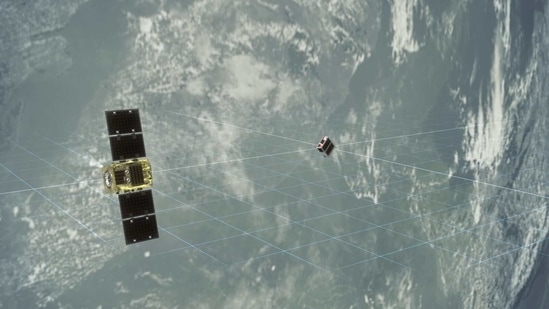Launch of spacecraft for debris removal demo using magnets postponed | All you need to know
Nasa said in its January report that at least 26,000 pieces of space junk that are the size of a softball or larger could destroy a satellite on impact.
The demonstration mission to test new technology developed by Astroscale, an orbital debris removal company, to clean up space junk was postponed on Saturday. The Japanese company had planned the launch of its spacecraft ELSA-d on a Soyuz-2.1a rocket, operated by GK Launch Services, from the Baikonur Cosmodrome in Kazakhstan.

While there has been no formal announcement from Astroscale regarding the next launch date, Russia’s state news agency RIA reported that the Soyuz-2.1a rocket will now be launched at 6.07am GMT (11.37am IST) on Sunday. Roscosmos space agency Director General Dmitry Rogozin said that the postponement decision was made after a voltage spike ahead of the planned launch, according to RIA.
Thousands of tons of debris, composed of defunct satellites, rocket bodies and parts of old satellites, pose risk to functional satellites, the International Space Station, and future missions. According to the latest figures provided by ESA's Space Debris Office in Germany, more than 9,200 tonnes of debris is present above the Earth’s atmosphere. It includes around 34,000 objects greater than 10 cm in size and an estimated 900,000 objects between 1-10 cm.
The National Aeronautics and Space Administration said in its January report that at least 26,000 pieces of space junk that are the size of a softball or larger could destroy a satellite on impact. It further warned that over 500,000 pieces of debris are the size of a marble, big enough to cause damage to spacecraft or satellites, and over “100 million the size of a grain of salt that could puncture a spacesuit.”
“Moreover, the growing volume of orbital debris threatens the loss of important space-based applications used in daily life, such as weather forecasting, telecommunications, and global positioning systems that are dependent on a stable space environment,” the Nasa report had said.
The launch of the ELSA-d mission, licensed by the UK Space Agency, will mark the world’s first commercial mission to demonstrate the core technologies necessary for docking and removal of space debris. However, the technology, which relies on a magnetic docking plate, targets the removal of satellites yet to be launched. While the technology currently being tested doesn’t address the issue of debris already present in space, Astroscale is working with JAXA, the Japan Aerospace Exploration Agency, on its first debris removal demonstration project.
“This landmark mission will also enable better-informed policy developments and drive the business case for on-orbit services such as end-of-life and active debris removal,” Nobu Okada, Astroscale Founder and CEO, said in a statement.






